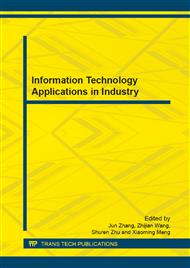[1]
Mambo M, Usuda K, Okamoto E. Proxy signature: delegation of the power to sign messages. IEICE Transactions on Fundamentals, 1996, 79−A (9): 1338−1353.
Google Scholar
[2]
Lee B, Kim H, Kim K. Secure mobile agent using strong non-designated proxy signature. Proc. of ACISP2001, LNCS 2119, Spring-Verlag, 2001, 474-486.
DOI: 10.1007/3-540-47719-5_37
Google Scholar
[3]
Huang X Y, Susilo W, Mu Y, et al. Proxy signature without random oracles. Proceedings of the 2nd International Conference on Mobile Ad-hoc and Sensor Networks. Berlin, German: Springer-Verlag, 2006: 473−484.
DOI: 10.1007/11943952_40
Google Scholar
[4]
Yong Yu, Ying Sun, Bo Yang, et al. Multi-proxy signature without random oracles. Chinese Journal of Electronics, 2008, 17(3): 475-480.
Google Scholar
[5]
Das M L, Saxena A, Gulati V P. An efficient proxy signature scheme with revocation. International Journal Informatica, 2004, 15(4): 455−464
DOI: 10.15388/informatica.2004.072
Google Scholar
[6]
Lu E J L, Hwang M S, Huang C J. A new proxy signature scheme with revocation. Applied Mathematics and Computation, 2005, 161(3): 799−806.
DOI: 10.1016/j.amc.2003.12.039
Google Scholar
[7]
Yong Yu, Bo Yang, Ying Sun, et al. Proxy signature scheme with fast revocation, Journal of Xidian University, 2007, 34(4): 638−641.
Google Scholar
[8]
Lize Gu, Zhongxian Li, Yixian Yang. A anonymous proxy signature scheme without a trusted party, Journal of Beijing University of Posts and Telecommunications, 2005, 28(1):48-50.
Google Scholar
[9]
Xiaoming Wang, Fangwei Fu. An anonymity-revoking blind proxy signature scheme, Chinese Journal of Computers, 2003, 26(1):51-54.
Google Scholar
[10]
XiaoTong Fu, Lizhen Yang, Guozhen Xiao. Remarks on an anonymity-revoking blind proxy signature scheme, Chinese Journal of Computers, 2005, 28(8):1404-1407.
DOI: 10.1109/cec-east.2004.7
Google Scholar
[11]
Pengcheng Zhang, Chuankun Wu. Cryptanalysis of an anonymity-revoking blind proxy signature scheme, Journal of the Graduate School of the Chinese Academy of Sciences, 2006, 23(6): 833-836.
Google Scholar
[12]
Zhenhua Liu, Yupu Hu, Xiangsong Zhang, et al. Secure Proxy Signature Scheme with Fast Revocation in the Standard Model. The Journal of China Universities of Posts and Telecommunications, 2009, 16(4): 116-124.
DOI: 10.1016/s1005-8885(08)60258-7
Google Scholar


